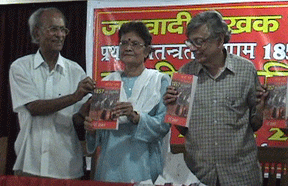 People's Democracy
People's Democracy
(Weekly
Organ of the Communist Party of India (Marxist)
No. 21
May 27, 2007
(Weekly
Organ of the Communist Party of India (Marxist)
|
Vol.
XXXI
No. 21 May 27, 2007 |
150 YEARS OF 1857 REVOLT
Janwadi Lekhak Sangh Organises Meet In Meerut

Irfan Habib (extreme right) releasing the special issue on 1857 of Naya Path
JANWADI LEKHAK SANGH, centre in collaboration with UP state unit and district unit organised a one-day programme at Meerut on May 19, 2007 commemorating the 150th anniversary of the 1857 war against colonial powers. The programme began by paying floral tributes at the martyrs’ column at Shaheed Park, the historic place where the war began. School children sang patriotic songs and then all participants marched to the hall of UP chamber of commerce. The inaugural session was addressed by Prof. Irfan Habib. He clarified many misgivings spread by some historians, writers, and even ruling elite. Further, he underlined the significance of the revolt in terms of the modern day polity in the age of globalisation. Prof. Habib said that the revolt was inspired by the ideals of the French revolution. People called the Indian soldiers as ‘Fauj-e-Hindostan’ or ‘Lashkar-e-Hindostan’. The war was wide-spread to remove the colonial regime from Indian soil. He elaborately gave data of the atrocities committed by the British rulers who did not spare even the old, women and children of the families of those who took part in the revolt. Those tyrants were not given any punishment in England. He also gave data of lakhs of people who sacrificed their lives during the revolt. Prof. Irfan Habib spoke about the miserable conditions of peasantry under that regime. He appreciated the supportive role of Urdu newspapers of that period. In the end, he recited some extracts from Bahadur Shah Zafar’s ghazals that echoed the agony of Indian people and of the heroes who had sacrificed their lives to liberate the nation from the colonial regime.
The seminar session on “communal harmony and the relevance of 1857” was addressed by Prof. Amar Faruqi, a well-known historian (DU) who said that the revolt was not confined to small regions as is generally upheld by colonial historians but was wide spread. He cleared the misgiving that southern regions or Punjab did not participate in it. Dr. (Mrs)Nuzhat Kazmi , an art historian (Jamia Millia) gave details of paintings related to 1857 and wondered why Indian painters did not depict the event. She said that it might be because of censorship or fear of the colonial regime that Indian painters did not depict this struggle as European artists did. She conjectured that those paintings might have been destroyed by the barbaric British rulers. P.K. Shukla (ICHR) said that history writing from colonial angle is still continuing and facts are distorted. The legacy of 1857 of upholding communal harmony has to be carried forward. Shabi Ahmad (ICHR) also spoke on various aspects of 1857. Javarimall Parakh, Namita Singh, Pradeep Saxena, Murali Manohar Prasad Singh, Chanchal Chauhan, Kanti Mohan Soz, Ibbar Rabbi, Rekha Awasthi and some other writers such as D.D.Dixit, Ved Prakash Batuk, K.D.Sharma, Aslam Jamshedpuri, Almash Ahmad, Ramesh Kumar also participated in the seminar. At the beginning of the function Munesh Tyagi, district secretary of JLS welcomed the guests and then Ravi Shankar Tyagi, a senior advocate delivered the welcome address. At the end Arvind Sharma thanked the participants on behalf of the organising committee.
The hall was decorated with panels of about 40 paintings related to 1857 provided by SAHMAT and a programme of singing of patriotic songs and recitation of poems at the end of the seminar was also organised by teachers and students of local schools and colleges.
In the inaugural session, the special issue on 1857 of Naya Path, the literary journal of JLS centre was released by Prof. Irfan Habib.